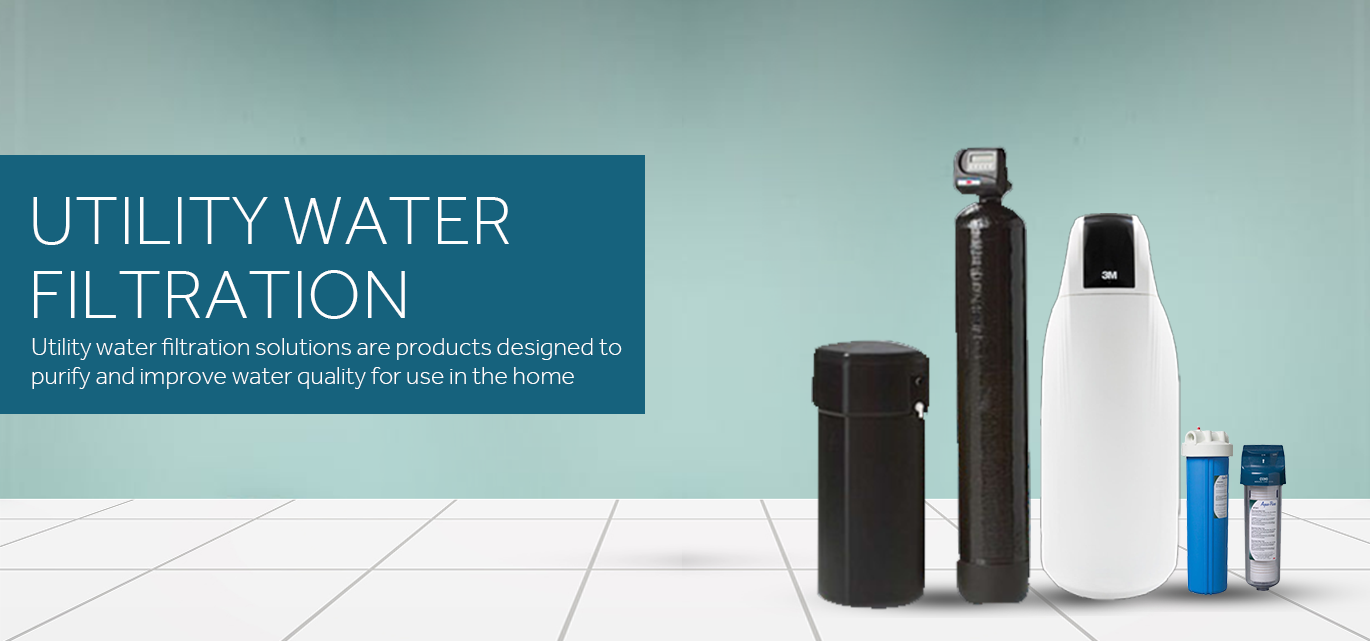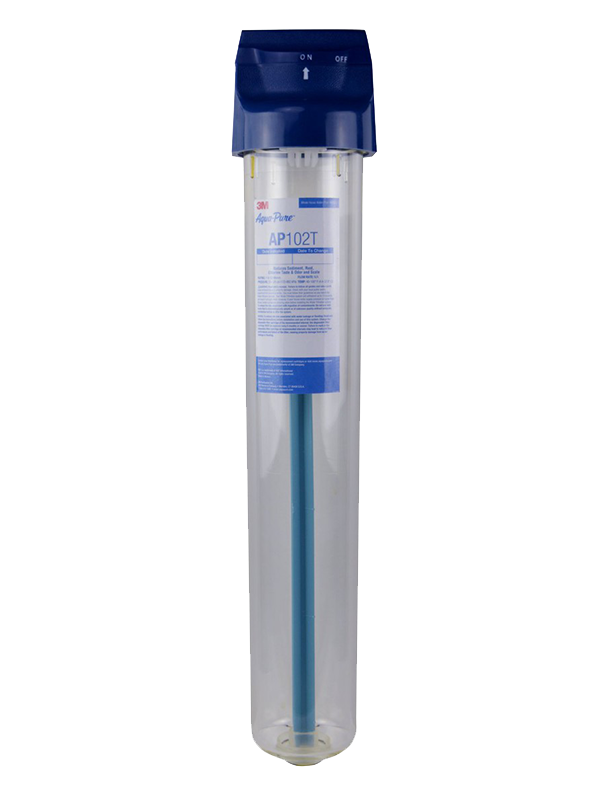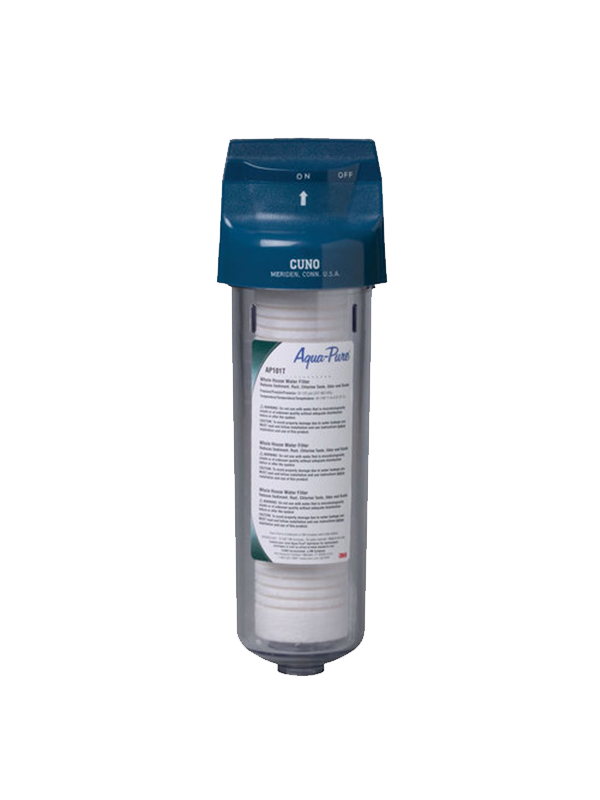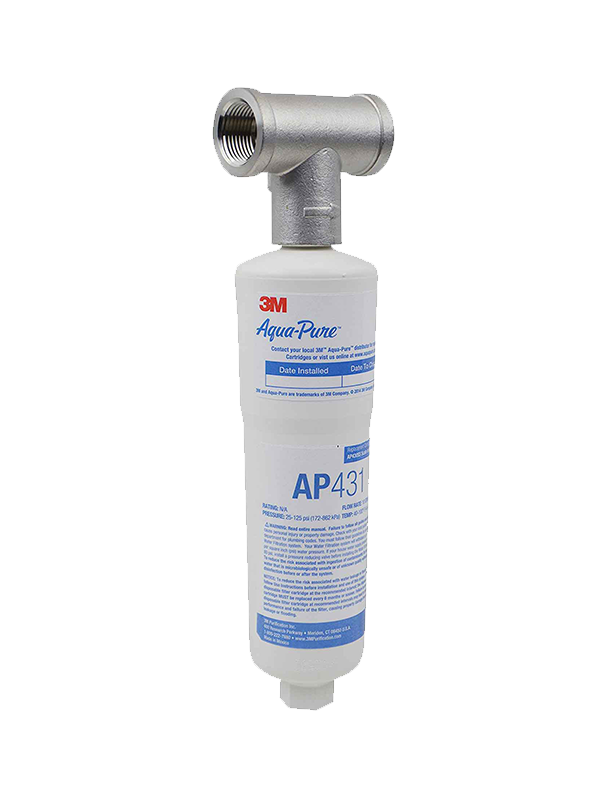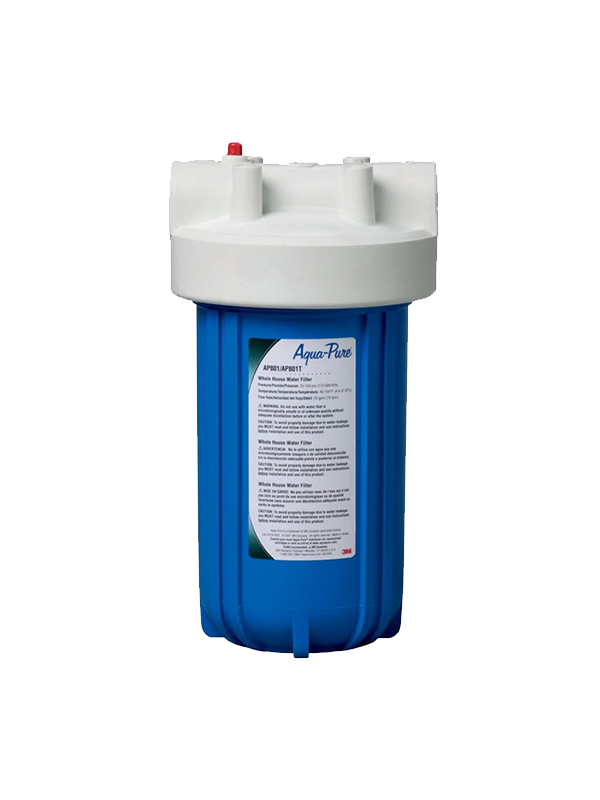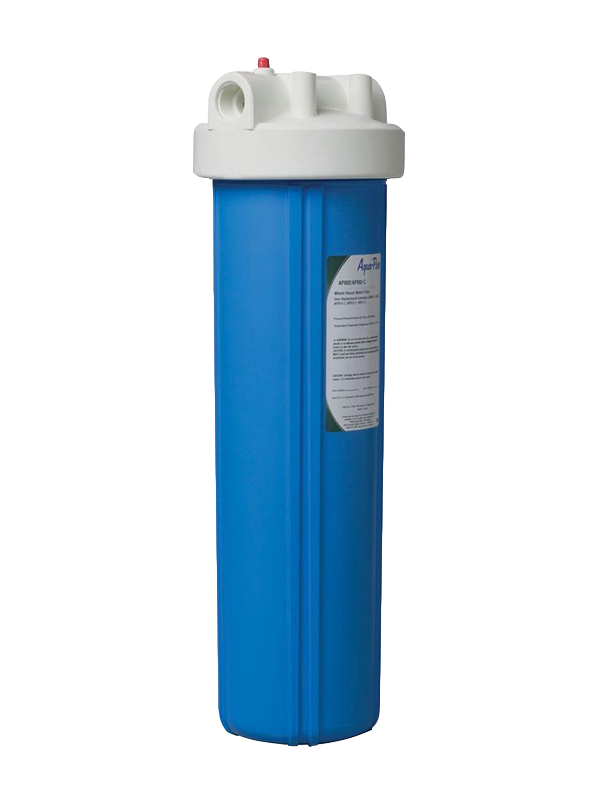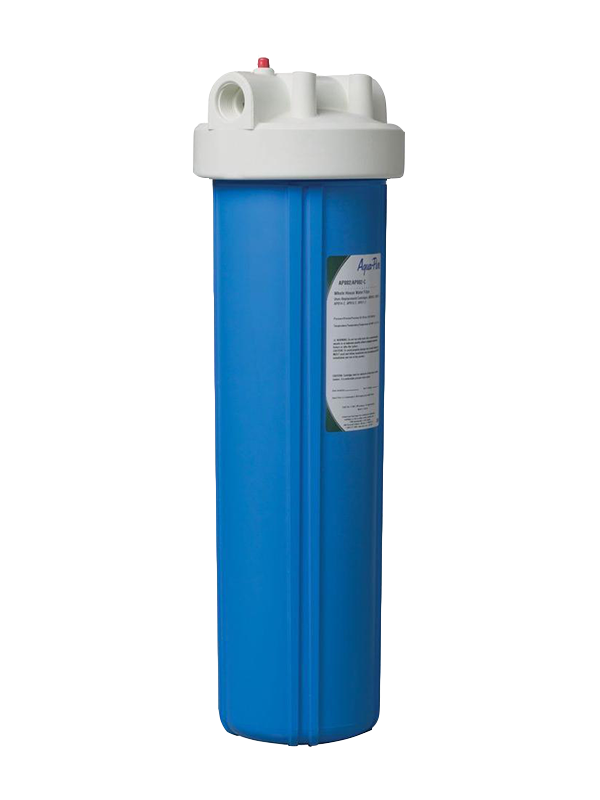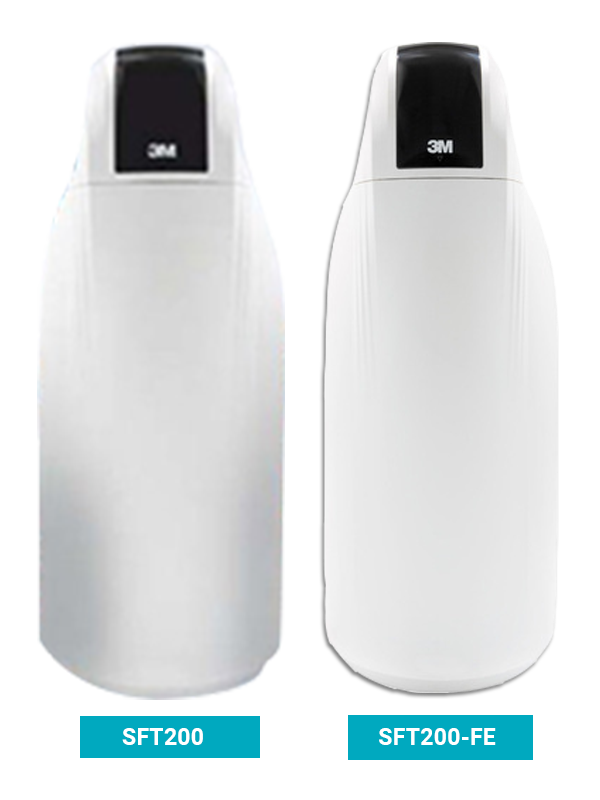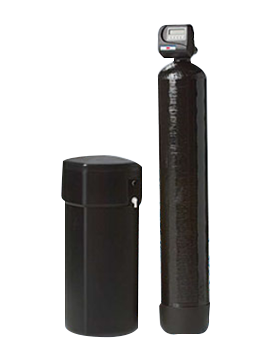Utility water filtration
Utility water filtration solutions are products designed to purify and improve water quality for use in the home
(excluding drinking water). The solutions cover the following main three types
Benefits

Zero water wastage

No Electricity Required

Minimal Maintenance

Home Appliance Protection
Our Products
Select Function
Select Installation Method
FAQ’S
1. What is Hardness?
Hard water is water that has high mineral content (in contrast with “soft water”). Hard water is formed when water percolates through deposits of limestone and chalk which are largely made up of calcium and magnesium carbonates. The total water hardness is the sum of the concentrations of Ca2+ and Mg2+ and is usually measured in ppm or parts per million.
2. What is TDS?
Total dissolved solids (TDS) is a measure of the combined content of all inorganic and organic substances contained in a liquid in molecular, ionized or micro-granular suspended form. TDS, like hardness is also measured in parts per million. Hardness is usually a subset of TDS.
3. I don't know the quality of my water. I just know that I am seeing white marks on my fittings. How do I find out the hardness?
Please drop us your contact details in the link: Book a Home Visit or call us 1800 266 2782. Our representatives will visit your home and do a free hardness test.
4. I do not see any problem with the water I am using. Why should I treat water for utility purposes?
You may think that you do not see the problems of impure utility water, but answer these questions to understand if that is true:
- Do you see white marks on your taps and fixtures in your bathroom that are difficult to remove? – This is because hardness in water is caused by presence of calcium and magnesium which form salts that stick to surfaces they come in contact with. These are very difficult to remove and leave ugly looking marks on your expensive fixtures, basins, etc.
- Do you notice the force of water in your taps and showers going down? – This is because the salts stick to surfaces and clog them reducing the pressure in your taps and fixtures.
- Have you faced a difference in the lather while shampooing from when you visit a different place? – Hard water lathers much less thus reducing the efficiency of your shampoos, soaps, detergents. Soft water on the other hand gives you a great bathing experience.
- Do you see your hair getting dry and fizzy as soon as it dries? – Hard water leaves salts on your scalp making it dry and frizzy.
5. What is the difference Between Ion Exchange technology and the Sequestering Technology?
Ion Exchange Technology and Sequestering Technology are both technologies used to treat the hardness in water. While Ion Exchange technology uses Resin to capture and thus remove Calcium and Magnesium ions from water(replacing it with Sodium); Sequestering Technology uses Polyphosphate Media to encapsulate the Calcium and Magnesium ions making them chemically inert, but do not remove them from water. Thus while the hardness test (which only detects the concentration of calcium and magnesium), will show a reduction in hardness after the ion exchange process, it will show no difference in the hardness level after sequestering. However, the effects of hard water such as permanent white scaling on taps, faucets and fixtures, damaged hair and skin due to hardness is prevented in both cases.
6. The Scale Prevention system does not show any difference in the TDS in water quality test. How do you claim that the product works to prevent scaling?
The Scale Prevention System uses the sequestering technology that does not remove the Calcium and Magnesium ions from water but encapsulates them with food grade polyphosphate sequester which makes the Calcium and Magnesium ions chemically inert thus ensuring that that the effects of hardness such as scaling are eliminated. The Hardness/TDS test, only shows the presence of these ions which is not changed, however, the encapsulation ensures that the effects of hardness are removed, thus preventing scaling. Here’s a video to show the difference between untreated water and water treated by 3M Scale Prevention System
7. Does a water softener give potable/drinking water?
Water Softeners only treat the calcium and magnesium content in the water reducing it to a tolerable limit. It does not treat the bacteria and other microbiological contamination in water that must be treated for the water to be potable – allowed for drinking.
8. Calcium and Magnesium are minerals required by the body. Why should we remove them from the same?
Yes, Calcium and Magnesium are minerals required for the body. However, the body requires the same in limited quantity. Water containing 300ppm or less of Hardness is considered soft water.
9. Are the softeners for industrial use?
These softeners are designed and manufactured specifically for residential purpose and are NOT softener plants meant for industrial applications.
10. Where do the softeners get installed?
In Villas, the softener can get installed right after the overhead tank or for a specific bathroom as per the requirement. In apartments, the softener can get installed for a single bathroom or if there is a single point of entry that is accessible for the specific flat. Please refer to the below image to get an idea of the installation point for Villas and Apartments.
11. Are the softeners for industrial use?
These softeners are designed and manufactured specifically for residential purpose and are NOT softener plants meant for industrial applications.
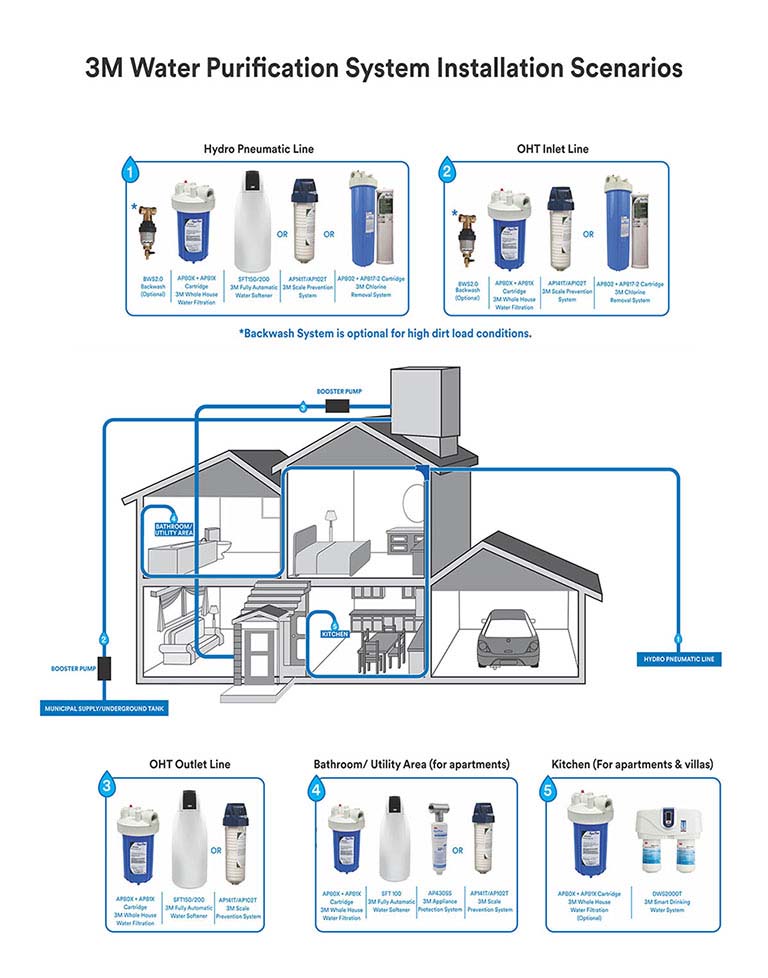
12. Do you provide drinking Water systems?
Yes. 3M Home Water Solutions has a range of products for treating impure water to potable water/drinking water systems The 3M Drinking Water System. It also has a range of products that do not provide drinking water but eliminate/treat other impurities in water such as hardness, chlorine, sediments, etc. which cause a lot of hazards even when used for utility purposes.
13. I live in a flat. Can I install the Water Softener in a flat? Where will it be installed in the flat?
Yes we have Water Softeners, specifically designed to fit into the flat. We can have the SFT100 installed inside your bathroom in your flat.
14. What is the recurring expenditure for the products?
The recurring expenditure varies for each product, water quality and consumption. Please find your nearest dealer at Where to Buy or call us at 1800 266 2782 to put you in touch with a nearest dealer.
15. Do you have a service team?
Yes, we have a service team to handle the installation and any post sales service you might require. Please call 1800 266 2782 for an installation request.
16. Do you do free installation?
The installation cost is NOT built into the price and is not free. Please note that the cost of installation varies depending on the type and area of installation. For best rates and right installation, please have the installation done through a 3M Trained Technician. You can call us at 1800 266 2782 to connect you with the same. The cost of any spares or additional requirements for installation will have to be borne by the customer.
17. What hardness level can your products handle?
The Fully Automatic Water Softener can handle a hardness level upto 1200ppm/ TDS value of 3000ppm. The Scale Prevention Systems can handle a Hardness level of 300ppm or TDS of 1000ppm. Please note that trained technicians will be able to serve a larger Hardness value by installing multiple units in combination.
18. Is your system susceptible to weather conditions?
The Fully Automatic Water Softener needs to be covered to protect it from the sun. The Scale Prevention Systems come with a transparent housing for easy cartridge viewing. However, this needs to be protected by the sun. In order to do the same, a Cover is provided with the product. If you do not receive a filter inside the product or from your distributor, call the toll free number 1800 266 2782 for assistance.
